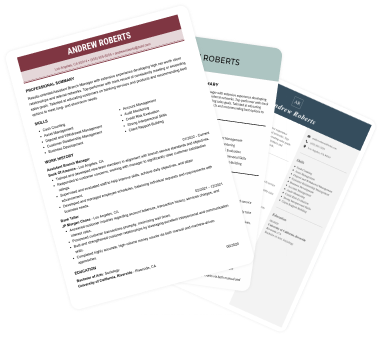Create a professional CV now!
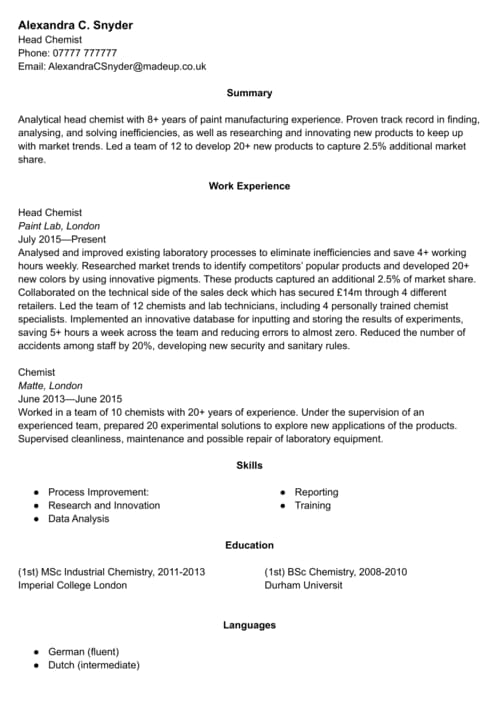 NO
NO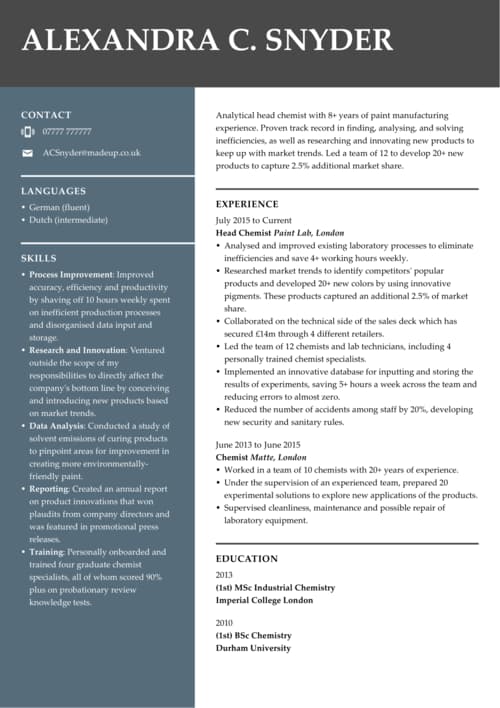 YES
YESLast updated on 4 February, 2026
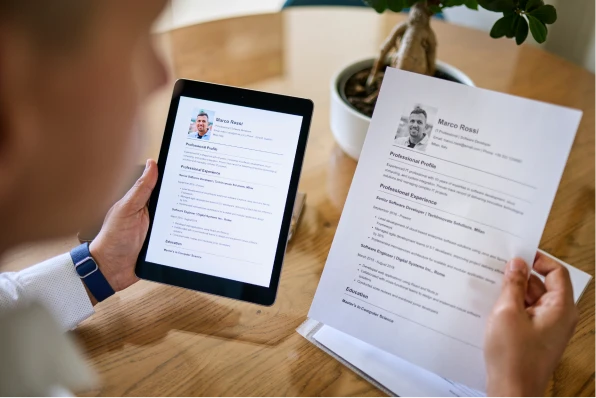
Our customers have been hired by*:
Analytical skills enable you to break down complex information, weigh options, and draw logical conclusions. These abilities are vital in fast-paced or data-heavy environments. They allow you to make informed decisions, solve complex problems efficiently, and make meaningful contributions to strategic goals.
Read on to find out what analytical skills involve, why employers value them, and how to present them to your recruiter, clearly and confidently.
In this guide, I’ll show you:
Create an effective CV in minutes. Choose a professional CV template and fill in every section of your CV in a flash using ready-made content and expert tips.
Create a professional CV now!
 NO
NO YES
YESWe created the sample on the left using our builder. See other good CV examples like this one.
Analytical skills are abilities to gather information, identify and interpret patterns, evaluate options, and reach rational conclusions. They’re about asking the right questions, identifying the core of a problem, and thinking methodically through data-driven solutions.
These skills are highly valued in the modern workplace for multiple professions, including business analysts, researchers, data scientists, engineers, and managers. However, they can be beneficial in nearly every job.
A workplace where challenges are met with calm reasoning, decisions are backed by evidence, and solutions are innovative, not rushed, seems almost too good to be true. But it’s easily doable with analytical thinkers in the team. That’s the power of analytical skills in action.
These skills enable teams to work more effectively, reduce risk, and avoid costly mistakes. Whether you're dealing with customers, managing projects, or interpreting performance data, having strong analytical skills allows you to deliver value reliably and intelligently. And that’s extremely important for any company and any industry, because it creates profit.
Below you’ll see 10 key examples of analytical skills, all functional across a wide range of careers.
Critical thinking means examining evidence before drawing conclusions. This involves questioning assumptions, testing ideas, and reviewing the pros and cons of different scenarios. It’s about being open-minded but also sceptical, and able to distinguish fact from opinion.
Grasping and utilising data is essential for analytical skills. Lacking this skill means missing out on valuable insights. This process may include recognising patterns in sales data, analysing survey findings, or pinpointing obstacles in a workflow.
Strong analytical skills begin with gathering and analysing accurate and relevant information. This skill involves knowing where to seek information, how to verify sources, and how to eliminate unnecessary details while gathering what you need in a structured and efficient manner.
If you’re an analytical thinker, you approach problems logically. Rather than jumping to solutions, you should clarify the issue, explore causes, and develop an action plan based on analysed data and gathered information. Problem-solving skills are key to analytical skills.
Recognising patterns helps you predict outcomes and avoid errors. From financial discrepancies to user behaviour trends, this is a vital analytical skill that allows you to identify trends and recurring themes in data, making your work more efficient.
Some decisions need to be made quickly. Good decision-making skills help ensure those choices are right and backed up with evidence. Drawing on data, experience, and logical reasoning helps you stay calm and make confident calls, even with limited information.
Small errors in data or logic can make the entire project fail. That’s why you need strong attention to detail. Analytical abilities often depend on spotting subtle inconsistencies. Whether proofing financial statements or debugging code, precision and diligence are key abilities for every analytical thinker.
Analytical thinkers excel at exploring multiple possibilities before taking action. Scenario analysis is a key method for doing just that. It involves imagining different “what if” situations and predicting the potential outcome. This approach enables professionals to assess risk, develop action plans, and propose informed strategic solutions.
Logical reasoning is a straightforward, step-by-step approach to thinking that helps you solve problems and articulate your ideas effectively. It involves breaking down big issues into smaller parts, identifying connections, and using facts to support your conclusions. This makes your ideas easier to understand and more convincing.
Analytical professionals often take a big-picture view of how different parts of a system interact. This skill involves understanding complex networks, whether they’re supply chains, software ecosystems, or business operations, and optimising them as a whole.
A strong CV summary will convince the recruiter you’re the perfect candidate. Save time and choose a ready-made personal statement written by career experts and adjust it to your needs in the LiveCareer CV builder.
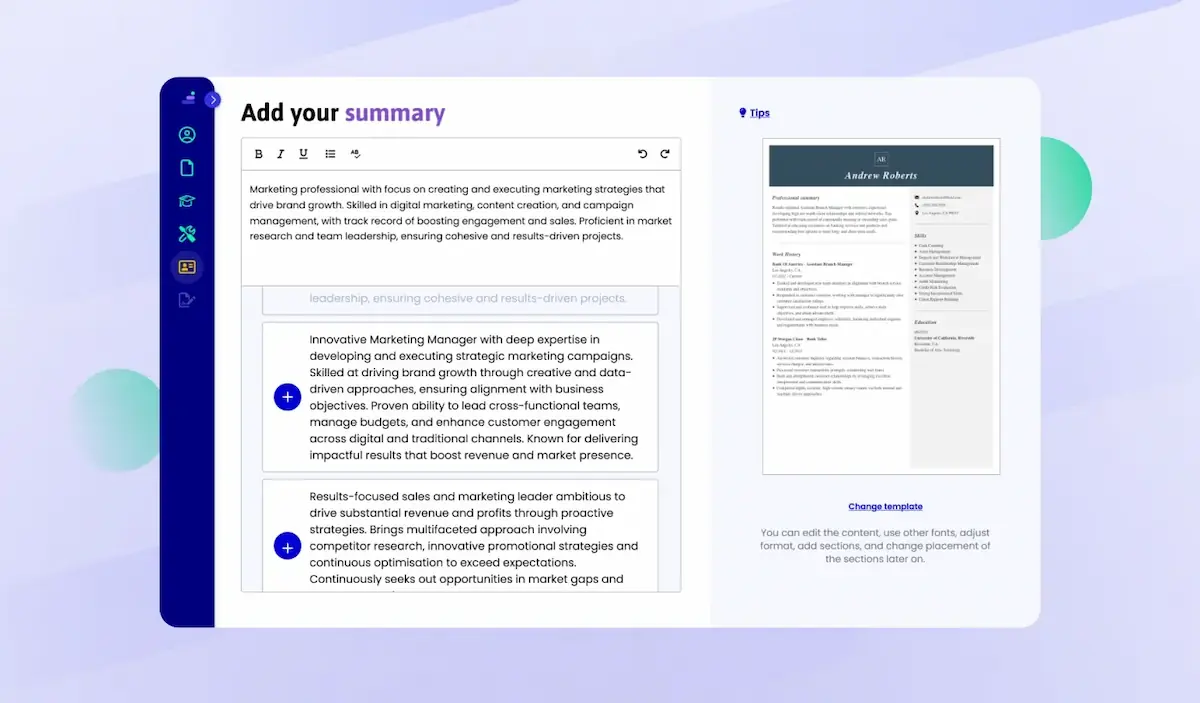
There are many ways to develop stronger analytical skills. The practical strategies outlined below can help you build confidence and enhance your performance across a range of tasks and roles, while also refining your analytical skills.
Track the challenges you face and the steps you take to resolve any problems on your way. This habit trains you to think more systematically, while also providing you with valuable material to use in interviews or on your CV.
Practising self-scepticism sharpens your ability to think clearly and avoid bias. Next time you make a decision, stop and ask why. What evidence supports your view? Could other explanations exist?
Whether it’s Excel, statistics, or business intelligence tools, investing in data skills can give you the tools to analyse situations more effectively. Free platforms like Coursera, edX, and FutureLearn offer great introductory courses.
Regularly reading high-quality content related to analytical skills helps you identify trends, understand diverse viewpoints, and refine your critical thinking. Try summarising key points after each article to train your analysis and remember them better.
Pick up on playing chess, Sudoku, or logic puzzles. They improve focus, pattern recognition, and decision-making and can also strengthen your analytical muscle over time. You can also play video games, as it’s proven that they can help you with your attention to detail.
When tackling multi-layered issues, use visual tools like mind maps. They can help you break ideas down into smaller parts, making them easier to study. It helps identify relationships and explore alternatives.
When possible, ask colleagues or mentors how you handled an analytical task. Constructive feedback can reveal gaps in your thinking. There may be something they would do differently that will inspire you to consider other approaches.
Take time to assess past decisions. Think about what worked well and what didn’t. Think about why. This will surely build your ability to apply lessons and refine your approach.
Strong analytical thinkers can explain their reasoning clearly to others. Whether through reports, presentations, or conversations, work on expressing your logic in a way that’s easy to follow.
Hackathons, debating societies, or analytical meetups are an excellent opportunity to test your thinking in real-time. These environments stretch your analytical skills and offer a collaborative way to grow among other analytical thinkers.
Analytical skills might not be as flashy as some soft skills, but they’re highly valued, especially in data-driven or strategic roles. Demonstrating them on your CV is a must. It demonstrates that you're thorough, thoughtful, and capable of making a meaningful impact.
Here’s how to show your analytical skills on a CV:
Your CV profile is an excellent opportunity to showcase your approach to analysis. Focus on how you solve problems, evaluate information, or make decisions. This is your first opportunity to demonstrate that you think deeply and act wisely.
Analytical skills example in a CV summary
Detail-oriented and insightful Analyst with over 5 years’ experience evaluating data, solving operational challenges, and supporting evidence-based decisions. Known for strong logical thinking, pattern recognition, and the ability to break complex problems into manageable parts. Looking to support innovation and growth at Altima Group by delivering accurate insights and strategic recommendations.
The best way to demonstrate your analytical skills is by providing detailed descriptions of your work experience. Write what you’ve done with them, use specific examples of projects or problems you’ve tackled, and what outcomes you achieved.
And remember, quantify results wherever possible. Metrics make your analytical skills measurable. Use active verbs like “analysed,” “identified,” “evaluated,” or “proposed” to highlight your impact.
Job description with analytical skills examples
Key responsibilities:
Key achievement:
You can also use your academic experience to demonstrate your analytical ability. This works particularly well if you’re writing an entry-level CV. In that case, highlight relevant coursework, extracurricular activities, and group projects that involved research, analysis, or problem-solving.
Examples of analytical skills presented in the education section
BSc (Hons) Economics and Statistics
University of Exeter, Exeter
September 2017–June 2020
Tailor your skills section to include the analytical tools and traits most relevant to the job offer. Be specific—don’t just say “problem-solving” or “data skills.” List actual methods, systems, or types of analysis you’re confident using.
Examples of analytical skills in the CV skills section
To make your CV stand out further, include additional sections that reflect your analytical skills.
Examples of analytical skills in extra sections:
Certifications
Interests
Publications
You know how to highlight your analytical skills on a CV. If you’ve followed the tips above, chances are you’ve landed a job interview. Now, how do you prove your analytical mindset in person?
Here’s how to show analytical skills in a job interview:
You don’t have to be a CV writing expert. In the LiveCareer CV builder you’ll find ready-made content for every industry and position, which you can then add with a single click.

Looking for other skills guides? Take a look at these:
Thank you for reading my article! Now that you know everything there is to know about analytical skills, I can only wish you good luck with your CV and upcoming interviews. You’ve got this!
Our editorial team has reviewed this article for compliance with Livecareer’s editorial guidelines. It’s to ensure that our expert advice and recommendations are consistent across all our career guides and align with current CV and cover letter writing standards and trends. We’re trusted by over 10 million job seekers, supporting them on their way to finding their dream job. Each article is preceded by research and scrutiny to ensure our content responds to current market trends and demand.
Category: CV Help
Crafting a job-winning CV is all about showcasing your unique skills and experiences. Start with a strong personal statement that highlights your career goals and achievements.
Try Our CV Builder Now